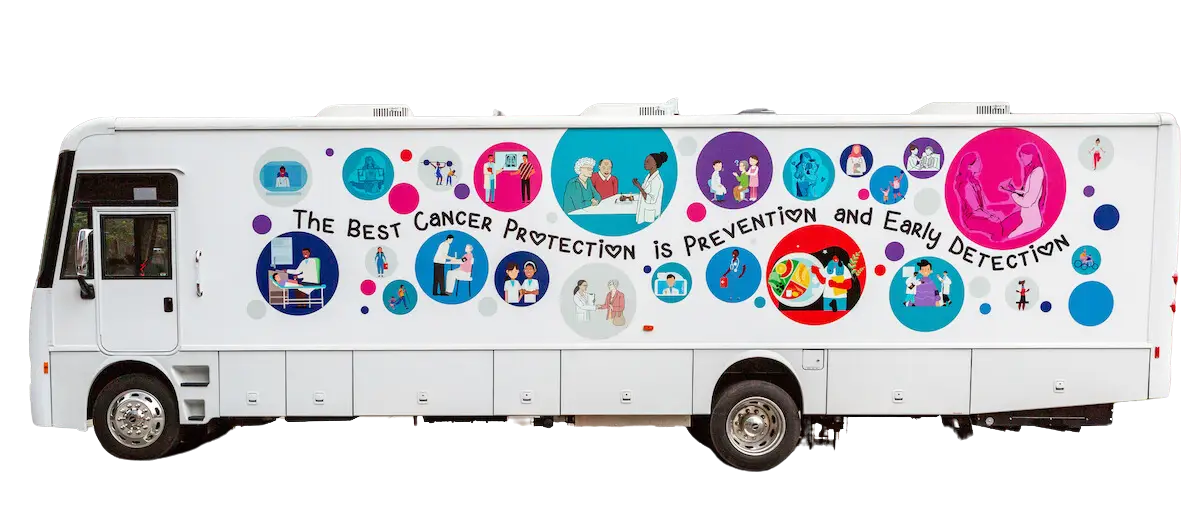Education: Breast Cancer
Breast Cancer: Mammograms
A mammogram is a picture of the inside of the breast.
Mammography may find tumors that are too small to feel. It may also find ductal carcinoma in situ (DCIS). In DCIS, abnormal cells line the breast duct, and in some women may become invasive cancer.
There are three types of mammograms:
- Film mammography is an x-ray picture of the breast.
- Digital mammography is a computer picture of the breast. Digital breast tomosynthesis (DBT) uses x-rays to take a series of pictures of the breast from many different angles. A computer is used to make 3-D pictures of the breast from these x-rays.
- Magnetic resonance imaging (MRI) may be used to screen women who have a high risk of breast cancer. MRI is a procedure that uses a magnet, radio waves, and a computer to make a series of detailed pictures of areas inside the body. This procedure is also called nuclear magnetic resonance imaging (NMRI). MRI does not use any x-rays and the woman is not exposed to radiation.

Breast Cancer Resources
Learn more with Information about screening courtesy of the National Cancer Institute’s PDQ cancer information summary for Breast Cancer.
Breast Exams
A clinical breast exam is an exam of the breast by a doctor or other health professional.
He or she will carefully feel the breasts and under the arms for lumps or anything else that seems unusual. It is not known if having clinical breast exams decreases the chance of dying from breast cancer.
Breast self-exams may be done by women or men to check their breasts for lumps or other changes. If you feel any lumps or notice any other changes in your breasts, talk to your doctor.

DID YOU KNOW?
ScreenNJ Screening Statistics
the Garden State
findings detected
Why Should You Get Screened?
One in two men and one in three women will develop cancer in their lifetime
Early diagnosis of cancer offers the best chance for successful treatment. When cancer care is delayed or inaccessible there is a lower chance of survival, greater problems associated with treatment, and higher costs of care.
Visit our Education page to learn more about various cancer types and screening options.
Types of Screenings Available:
- Breast Cancer
- Cervical Cancer
- HPV-Related Cancers
- Colorectal Cancer
- Genetically-Linked Cancers
- Lung Cancer
- Prostate Cancer
- Skin Cancer
Get the Assistance you need
Learn More About Patient Navigation
Patient navigators are trained, culturally competent healthcare professionals who work with patients, families, physicians and other healthcare providers to ensure cancer patients’ needs are appropriately and effectively addressed.
Get connected to a navigator to gain assistance with qualification, scheduling, transportation, and more.
Discover our mobile health unit
Free Cancer Screenings and Care Coordination for the uninsured and under-served across New Jersey
Now Offering:
- Patient navigation for care coordination
- Education and outreach
- Supportive services to address social determinants of health
- History and physical examinations
- Laboratory testing
- Referrals and authorizations


Who Qualifies for Screening?
The New Jersey Cancer Education and Early Detection Screening Program (NJCEED) is part of the New Jersey Department of Health.
NJCEED provides comprehensive screening services for breast, cervical, prostate, and colorectal cancer. The services include education, outreach, early detection, case management, screening, tracking, and follow-up. Breast, cervical, prostate, and colorectal cancers can be treated more effectively when found early.
Persons eligible for these services must be at or below 250% of the Federal Poverty Level and be uninsured or under-insured. For more information, please call 1-800-328-3838 or locate a screening location here.
Screening for cancer is covered with no deductible or co-pay by many insurance plans including Medicare, and patients with no insurance may be able to receive recommended cancer screenings at their NJ CEED agency or at other ScreenNJ partner sites. Visit our Frequently Asked Questions page to learn more.
